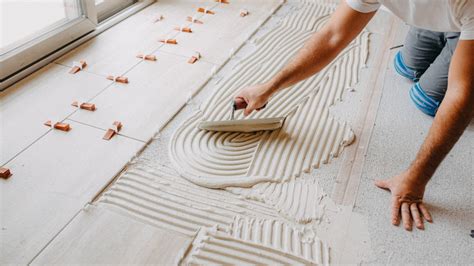
Durable and stylish flooring that homeowners can trust is the focus of HGTV star Mike Holmes’ latest endorsement, as he champions quality and longevity in home renovations, emphasizing that flooring is not an area to cut corners. Holmes underscores the importance of selecting flooring options that not only enhance a home’s aesthetic appeal but also withstand the test of time, offering both value and peace of mind.
Mike Holmes, known for his commitment to quality and his no-nonsense approach to home improvement, is advocating for homeowners to prioritize durable and stylish flooring solutions. According to Holmes, flooring is a critical element of any home renovation project, and choosing the right materials and installation methods is essential for long-term satisfaction. “When it comes to renovations, flooring is not the place to cut corners,” Holmes states. “It’s an investment in your home and your future.”
The Importance of Quality Flooring
Holmes stresses that flooring is more than just a surface to walk on; it significantly impacts a home’s overall look, feel, and value. Selecting high-quality flooring materials and ensuring proper installation can prevent issues such as premature wear, water damage, and structural problems. Holmes advises homeowners to consider factors like durability, maintenance requirements, and aesthetic appeal when choosing flooring options.
“Flooring is one of the most used surfaces in your home,” Holmes explains. “It needs to stand up to daily wear and tear, spills, and temperature changes. That’s why it’s so important to choose materials that are designed to last.”
Holmes’ Flooring Recommendations
While the specific brands or products Holmes endorses may vary depending on partnerships and promotions, his general recommendations focus on materials known for their durability and style. These often include:
- Hardwood: Prized for its timeless beauty and longevity, hardwood flooring can add significant value to a home. Holmes advises homeowners to choose solid or engineered hardwood options, depending on their specific needs and budget.
- Tile: Ideal for areas prone to moisture, such as bathrooms and kitchens, tile flooring is available in a wide range of styles and colors. Holmes recommends porcelain or ceramic tile for its durability and resistance to water damage.
- Laminate: A cost-effective alternative to hardwood, laminate flooring offers a similar look and feel at a lower price point. Holmes advises homeowners to choose high-quality laminate options with a durable wear layer.
- Luxury Vinyl: Increasingly popular for its versatility and durability, luxury vinyl flooring is available in planks, tiles, and sheets. Holmes recommends luxury vinyl for its water resistance, ease of maintenance, and realistic appearance.
Proper Installation Techniques
In addition to selecting the right flooring materials, Holmes emphasizes the importance of proper installation techniques. He advises homeowners to hire qualified and experienced contractors who can ensure that the flooring is installed correctly and according to manufacturer specifications.
“Proper installation is just as important as choosing the right materials,” Holmes explains. “If your flooring isn’t installed correctly, it won’t last as long, and you could end up with problems down the road.”
Holmes recommends that homeowners thoroughly research potential contractors, check their references, and obtain multiple quotes before making a hiring decision. He also advises homeowners to ask contractors about their installation methods, warranties, and insurance coverage.
Avoiding Common Flooring Mistakes
Holmes cautions homeowners against making common flooring mistakes, such as choosing materials that are not suitable for their lifestyle or budget. He advises homeowners to carefully consider their needs and preferences before making a purchase.
“Don’t just choose flooring based on what looks good in a magazine or on TV,” Holmes warns. “Think about how you use your home and what type of flooring will best meet your needs.”
Other common flooring mistakes that Holmes advises homeowners to avoid include:
- Failing to properly prepare the subfloor: The subfloor must be clean, level, and dry before flooring can be installed.
- Not allowing flooring to acclimate to the home’s environment: Flooring materials need to adjust to the temperature and humidity levels in the home before installation.
- Using the wrong type of adhesive or underlayment: The adhesive and underlayment must be compatible with the flooring material and the subfloor.
- Neglecting to properly maintain the flooring: Regular cleaning and maintenance are essential for extending the life of flooring.
The Long-Term Benefits of Investing in Quality Flooring
While high-quality flooring may require a larger upfront investment, Holmes argues that it offers significant long-term benefits. These benefits include:
- Increased home value: Durable and stylish flooring can increase a home’s resale value.
- Reduced maintenance costs: High-quality flooring requires less maintenance and repairs.
- Improved indoor air quality: Some flooring materials, such as hardwood and tile, are naturally resistant to allergens and mold.
- Enhanced comfort and aesthetics: Quality flooring can improve the overall look and feel of a home.
“Investing in quality flooring is an investment in your home’s future,” Holmes concludes. “It’s a decision that will pay off for years to come.”
Home Improvement Tips from Mike Holmes
Beyond flooring, Mike Holmes offers a range of home improvement tips to help homeowners create safe, comfortable, and sustainable living spaces. Some of his key recommendations include:
- Prioritize safety: Always address safety issues, such as faulty wiring or leaky plumbing, before undertaking any other renovations.
- Hire qualified professionals: Don’t attempt to do everything yourself. Hire qualified contractors for tasks that require specialized skills or knowledge.
- Obtain necessary permits: Make sure to obtain all necessary permits before starting any renovation project.
- Follow building codes: Adhere to all local building codes and regulations.
- Plan ahead: Develop a detailed plan and budget before starting any renovation project.
- Choose sustainable materials: Opt for eco-friendly and sustainable building materials whenever possible.
- Properly insulate your home: Insulation is essential for energy efficiency and comfort.
- Maintain your home regularly: Regular maintenance can prevent costly repairs and extend the life of your home.
The Holmes Approved Homes Program
Mike Holmes is also involved in the Holmes Approved Homes program, which sets rigorous standards for new home construction. Homes that meet these standards are built to a higher level of quality and safety, providing homeowners with added peace of mind.
The Holmes Approved Homes program focuses on key areas such as:
- Structural integrity: Ensuring that the home is built to withstand the elements and meet all building code requirements.
- Energy efficiency: Maximizing energy efficiency through proper insulation, windows, and HVAC systems.
- Indoor air quality: Minimizing indoor air pollutants and allergens.
- Water management: Preventing water damage and mold growth.
- Safety: Incorporating safety features such as smoke detectors and carbon monoxide detectors.
Mike Holmes’ Commitment to Quality and Integrity
Mike Holmes has built a reputation as a trusted advocate for homeowners, emphasizing the importance of quality, integrity, and transparency in the construction and renovation industries. His commitment to these values has made him a respected figure in the home improvement world.
Holmes believes that homeowners deserve to have access to reliable information and qualified professionals who can help them make informed decisions about their homes. He continues to use his platform to educate and empower homeowners, helping them create safe, comfortable, and sustainable living spaces.
In summary, Mike Holmes’ message regarding flooring is clear: invest in quality materials and proper installation to ensure long-term satisfaction and value. By following his advice, homeowners can create beautiful and durable floors that will enhance their homes for years to come.
Detailed Flooring Options and Considerations
Delving deeper into specific flooring options, it’s crucial to understand the nuances of each material and how they suit different needs and environments within a home.
- Hardwood Flooring: The Timeless Choice
Hardwood flooring is renowned for its natural beauty, durability, and the warmth it brings to a space. It’s available in two primary types: solid hardwood and engineered hardwood.
* *Solid Hardwood:* This consists of planks made from a single piece of wood. It can be sanded and refinished multiple times, making it a long-lasting option. However, it's more susceptible to moisture and temperature fluctuations, making it less suitable for basements or bathrooms.
* *Engineered Hardwood:* Constructed with multiple layers of wood veneer bonded together, engineered hardwood is more stable than solid hardwood and less prone to warping or expanding. It can be installed in areas with higher moisture levels, though it still requires careful maintenance.
When selecting hardwood, consider the type of wood species. Oak is a popular choice for its durability and versatility, while maple offers a smoother, more contemporary look. Exotic hardwoods like Brazilian cherry or tigerwood add a distinctive flair but may come with a higher price tag. The finish of the hardwood also plays a significant role in its appearance and durability. Polyurethane finishes are common for their resistance to scratches and water damage, while oil-based finishes offer a more natural look and feel.- Tile Flooring: Versatility and Durability
Tile flooring is an excellent choice for areas that require water resistance, such as bathrooms, kitchens, and entryways. It’s available in various materials, including ceramic, porcelain, and stone.
* *Ceramic Tile:* Made from clay that is fired at high temperatures, ceramic tile is durable and relatively inexpensive. It's suitable for most residential applications, but it may not be as resistant to wear and tear as porcelain tile.
* *Porcelain Tile:* A denser and more durable option than ceramic tile, porcelain tile is made from a finer clay and fired at even higher temperatures. It's highly resistant to water, stains, and scratches, making it ideal for high-traffic areas and outdoor use.
* *Stone Tile:* Natural stone tiles, such as granite, marble, and slate, offer a luxurious and unique look. However, they require more maintenance than ceramic or porcelain tile and can be more porous, requiring sealing to prevent staining.
When choosing tile, consider the size, shape, and color. Larger tiles can create a more seamless look, while smaller tiles can add intricate patterns. The grout used between the tiles is also an important factor, as it can affect the overall appearance and maintenance of the floor. Epoxy grout is a durable and stain-resistant option, while cement-based grout is more common but requires regular sealing.- Laminate Flooring: A Cost-Effective Alternative
Laminate flooring is a synthetic product that mimics the look of hardwood or tile at a lower cost. It consists of a core layer of fiberboard topped with a decorative layer and a protective wear layer.
* *Advantages:* Laminate flooring is relatively easy to install, scratch-resistant, and available in a wide range of styles. It's also a good option for those with allergies, as it doesn't harbor dust mites or other allergens.
* *Disadvantages:* Laminate flooring is not as durable as hardwood or tile and cannot be refinished. It's also more susceptible to water damage, so it's not suitable for bathrooms or other areas with high moisture levels.
When selecting laminate flooring, pay attention to the thickness of the wear layer, which determines its durability. Look for laminate flooring with a high AC (Abrasion Class) rating for high-traffic areas. Also, consider the underlayment, which provides cushioning and sound insulation.- Luxury Vinyl Flooring: The Versatile Choice
Luxury vinyl flooring (LVF) has gained popularity in recent years due to its durability, water resistance, and realistic appearance. It’s available in planks (LVP), tiles (LVT), and sheets, offering a variety of design options.
* *Advantages:* LVF is highly resistant to water, scratches, and stains, making it a great choice for kitchens, bathrooms, and basements. It's also easy to install and maintain.
* *Disadvantages:* LVF is a synthetic product, so it may not have the same natural look and feel as hardwood or stone. It's also more expensive than laminate flooring.
When choosing LVF, consider the thickness of the wear layer, which determines its durability. Look for LVF with a high wear layer thickness for high-traffic areas. Also, consider the installation method, which can be either glue-down or click-lock. Click-lock LVF is easier to install, while glue-down LVF provides a more permanent and stable installation.The Importance of Subfloor Preparation
Regardless of the flooring material you choose, proper subfloor preparation is crucial for a successful installation. The subfloor must be clean, level, and dry before any flooring can be installed.
- Cleaning: Remove any debris, dirt, or old adhesive from the subfloor.
- Leveling: Use a self-leveling compound to fill any cracks or uneven spots in the subfloor.
- Drying: Ensure that the subfloor is completely dry before installing any flooring. Moisture can lead to mold growth and other problems.
Professional Installation vs. DIY
While some flooring options, such as laminate and click-lock LVF, can be installed as a DIY project, others, such as hardwood and tile, are best left to professionals. Professional installers have the tools, experience, and expertise to ensure that the flooring is installed correctly and according to manufacturer specifications.
The Environmental Impact of Flooring
When choosing flooring, it’s important to consider its environmental impact. Look for flooring materials that are made from sustainable resources, such as bamboo or recycled content. Also, consider the VOC (Volatile Organic Compound) emissions of the flooring. VOCs are chemicals that can be released into the air and can cause health problems. Look for flooring materials with low VOC emissions.
Maintenance and Care
Proper maintenance and care are essential for extending the life of your flooring. Follow the manufacturer’s recommendations for cleaning and maintenance.
- Hardwood: Sweep or vacuum regularly to remove dirt and debris. Use a damp mop with a wood floor cleaner to clean the floor. Avoid using excessive water, which can damage the wood.
- Tile: Sweep or vacuum regularly to remove dirt and debris. Use a damp mop with a tile cleaner to clean the floor. Seal the grout regularly to prevent staining.
- Laminate: Sweep or vacuum regularly to remove dirt and debris. Use a damp mop with a laminate floor cleaner to clean the floor. Avoid using excessive water, which can damage the laminate.
- Luxury Vinyl: Sweep or vacuum regularly to remove dirt and debris. Use a damp mop with a vinyl floor cleaner to clean the floor.
Budgeting for Flooring
Flooring can be a significant investment, so it’s important to create a budget before you start shopping. Consider the cost of the materials, installation, and any necessary subfloor preparation. Get quotes from multiple contractors and compare prices. Also, factor in the cost of maintenance and care.
By carefully considering these factors, you can choose the right flooring for your needs and budget.
Frequently Asked Questions (FAQ)
-
What type of flooring does Mike Holmes generally recommend for homes with pets and children?
- Mike Holmes typically suggests durable and water-resistant options like luxury vinyl flooring (LVF) or high-quality laminate. These materials can withstand heavy foot traffic, spills, and scratches, making them ideal for homes with pets and children. He also emphasizes the importance of a good wear layer for added protection.
-
How important is professional installation, according to Mike Holmes, and when can a homeowner consider a DIY approach?
- Holmes stresses that professional installation is crucial for certain flooring types, such as hardwood and tile, to ensure proper installation and longevity. He suggests that homeowners can consider a DIY approach for easier-to-install options like click-lock LVF or laminate, but only if they have the necessary skills and tools. Proper subfloor preparation is essential regardless of who does the installation.
-
What are some common mistakes homeowners make when choosing flooring, and how can they be avoided based on Holmes’ advice?
- Common mistakes include failing to consider the room’s function, neglecting subfloor preparation, and choosing materials that aren’t durable enough for their lifestyle. Holmes advises homeowners to carefully assess their needs, prepare the subfloor properly, and select high-quality materials that are appropriate for the specific area of the home. Avoiding trends and focusing on timeless, durable options is also recommended.
-
How does Mike Holmes view the long-term value of investing in high-quality flooring versus opting for cheaper alternatives?
- Holmes believes that investing in high-quality flooring provides significant long-term value, including increased home value, reduced maintenance costs, improved indoor air quality, and enhanced comfort. While cheaper alternatives may save money upfront, they often require more frequent repairs or replacements, ultimately costing more in the long run. He emphasizes that flooring is an investment in your home’s future.
-
What role does sustainability play in Mike Holmes’ flooring recommendations, and what types of eco-friendly options does he suggest?
- Holmes is a strong advocate for sustainability and encourages homeowners to consider eco-friendly flooring options. He suggests materials like bamboo, cork, and recycled content flooring. Additionally, he recommends looking for products with low VOC emissions to improve indoor air quality. Choosing locally sourced materials can also reduce the environmental impact of transportation.









